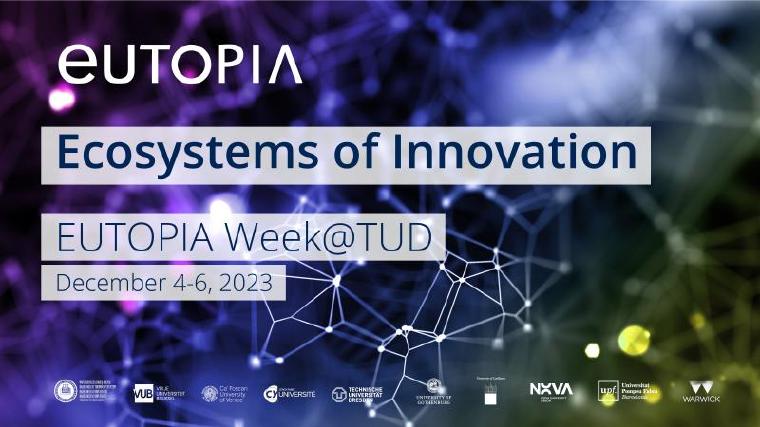"EUTOPIA Week at Ljubljana is witnessing a major transformational phase of the Alliance. One of the most important events is the collaboration of Global Partners. By signing the Global Partnership Charter, Monash University, Australia. Stellenbosch University, South Africa, Kyungpook National University, South Korea, and The International University of Rabat, Morocco, officially became active global partners of the EUTOPIA University Alliance.
As there is a higher scope of extension of the worldwide partnership, this marks a juncture for the second development phase of the Alliance. The Panel Discussion on "
EUTOPIA and Global Partnerships" held at the University of Ljubljana's Rectorate contributed to knowing better where the Alliance stands in this regard. The session was chaired by Seán Hand, Pro Vice-Chancellor of the University of Warwick. He mentioned the relevance of the Charter and the idea of fostering international academic partnerships. Cecilia Hewlett from Monash University highlighted expanding higher-level strategic partnerships. Jin San Kim from Kyungpook National University emphasised how EUTOPIA's model helps to avoid the typical 'mismatches' in collaboration and exchange programmes between universities. Robert Kotze from Stellenbosch University elaborated an exciting approach to certain aspects of the Global Partnership Charter. He underlined the concept of 'responsible internationalisation', inclusion and diversity from a decolonial worldview. João Amaro de Matos, the vice-rector for education and international development of NOVA University, added that a "strategy of international expansion beyond Europe should consider those regions that are critical for manpower in the future", suggesting more partners from the global south. The panel agreed that global partnerships help the transformation process of European higher education, bringing more diversity and inclusion."
By Thomas T'Joen & Renu Elza Varkey
**
"Later in the day, the Faculty of Social Sciences hosted a roundtable titled “Migrations, reintegration and sustainable development in the post-Yugoslav context”. I expected a session focused on history through the lens of a culture I know next to nothing about, but I was pleasantly surprised to witness an open discussion about the migration and mobility of researchers who were in their early careers when Yugoslavia dissolved. I learned the personal journeys of these researchers (dr. Katja Kobolt, dr. Tamara Pavasović Trošt, dr. Aljoša Pužar, and dr. Colin Rittberg) and their views on mobility in the academic world.
Dr. Aljoša Pužar said: “People don't move much actually in normal times. The only people who move are either privileged, or they forced to move. Academics somehow often belong to both those groups at the same time.” There was mention for example of a rule enforced sometime in the past at the University of Ljubljana where researchers must spend three months abroad uninterrupted in order to become an Associate Professor, which put a lot of barriers for a lot of people (familial, financial, etc.)
The roundtable ended on a somewhat hopeful note, with the speakers appreciating EUTOPIA’s work in research mobility, as well as the focus on the inclusion of the Balkans countries in a European network of universities."
By Thomas T'Joen
**
"Two consecutive panel discussions on sustainability and interdisciplinarity, both significant aspects of the Alliance, shielded the audience from a rainy afternoon on the second day of the EUTOPIA Week. Lela Melon (University of Pompeu Fabra-Barcelona) gained the public's attention, asking, "what do you find the biggest challenge in the transformation of higher education curricula?". She then elaborated on the relevance of the ECOTOPIA programme (economics joint bachelor programme in 5 EUTOPIA universities). She said that sustainability in ECOTOPIA focuses on planetary well-being, meaning environmental and social sustainability, and also considers personal well-being. Joanna Wagner, the co-founder of the NGO La Belle EDuC, was the next speaker. Their mission is centred on ensuring that the world's future employees, entrepreneurs and leaders are prepared during their studies to reconcile economic activities with present and future social and environmental challenges. She described La Belle EDuC's first International Certification in Higher Education Programmes.
The next panel was dedicated to People-Centred Urban Mobility, where interdisciplinary learning practices and communities of practices were the points of discussion. Gregor Cerinsek and Sara Arko (University of Ljubljana) talked about Built4People, and People-Centric Sustainable built environments. The panellists noted the importance of involving Social Sciences and Humanities in Engineering and Technical teams and projects. The session also examined the potential impact of interdisciplinarity and sustainability in the Alliance, higher education and industry."
You can watch the Panel Discussion on Urban Mobility here.
By Renu Elza Varkey

